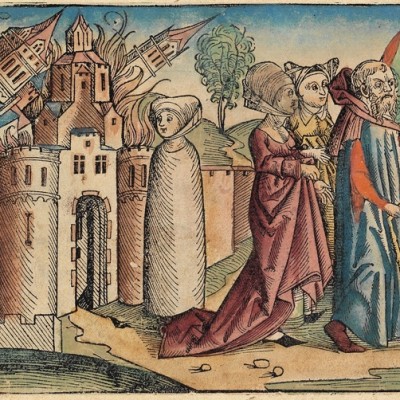January 15-21, 2017
This week’s reading details the origins of the twelve tribes of Israel, the name that God ultimately gives to Jacob (Genesis 32:28 and 35:10). Having been sent by his father, Abraham, to find a mate among his own people, Jacob travels to Haran, and stays much longer than I’m sure he anticipated!
He quickly meets Rachel, the daughter of Laban, and falls in love with her, and thus begins a series of deceptions that will continue for many years. Laban agrees to give Rachel to Jacob in marriage in exchange for 7 years of labor, but tricks him into marrying an older daughter, Leah. Then Laban demands an additional 7 years for Rachel. Both wives will bear children to Jacob, as will maid servants of both women:
- Leah – Reuben, Simeon, Levi, and Judah
- Bilhah (Rachel’s maiden servant) – Dan and Naphtali
- Zilpah (Leah’s maiden servant) – Gad and Asher
- Leah – Issachar, Zebulun, and Dinah
- Rachel – Joseph
Jacob eventually gains great wealth working for Laban, and, following a series of additional deceptions, finally journeys back to Canaan to be reunited with his father, mother, and brother, Esau, but not before one final confrontation as Jacob flees, which leads to an agreement between the men detailed in Genesis 31:43-55. This agreement, or covenant (v. 44), includes all of the elements of a covenant that we will observe in future readings: an oath, a sacrifice, a meal, and a sign (the pillar).
Sadly, upon his return to Canaan, Rachel dies in childbirth, but delivers Benjamin, the son who will take on an important role in Jacob’s final years.
In the final days of this week’s reading, the Bible chronicles the fascinating story of Joseph, who is sold into slavery by his brothers, but ultimately becomes the most important ruler in all of Egypt with the sole exception of the Egyptian Pharaoh himself!
Joseph is clearly destined for something significant from the very beginning, as his dreams foretell that his brothers will one day bow to him. Sparked by their jealousy, the brothers sell Joseph to the Ishmaelites, who then sell him to an Egyptian ruler named Potipher. There, Joseph becomes quite powerful because God blesses the works of Joseph as he serves the Potipher’s household. Joseph’s troubles, however, are far from over as scandalous, yet false, accusations by Potipher’s wife lands Jacob in prison.
It is in prison that Joseph demonstrates that God is both present and powerful, as he gives Joseph the ability to interpret the dreams of Pharaoh. Recognizing that God is with Joseph, Pharaoh elevates Joseph to power once again, and Joseph soon marries and has two children, Ephraim and Manasseh. These two men will later round out the 12 tribes of Israel – one as a replacement for Joseph and the other as a replacement for Levi, whose tribe will become priests serving the nation of Israel. Each tribe will be given an allotment of the promised land of Canaan in complete fulfillment of the earlier promises made to Abraham, Isaac, and Jacob.
Ultimately, famine will bring Jacob and his other sons from Canaan to Egypt in search of food, and there they will rediscover Jacob, who has long considered by Jacob to be dead. In a vivid illustration of the humility that God will ultimately require of his own son, the Christ, and all of those who would be called by His name (Christians), Joseph completely forgives his brothers of their earlier misdeeds:
“Do not be distressed and do not be angry with yourselves for selling me here, because it was to save lives that God sent me ahead of you…[He]sent me ahead of you to preserve for you a remnant on earth and to save your lives by a great deliverance. So then, it was not you who sent me here, but God.”
Genesis 45:4-8 (NIV)
It makes me wonder – what is God doing in our lives today, that we don’t recognize, that will ultimately fulfill His plan far into the future?

